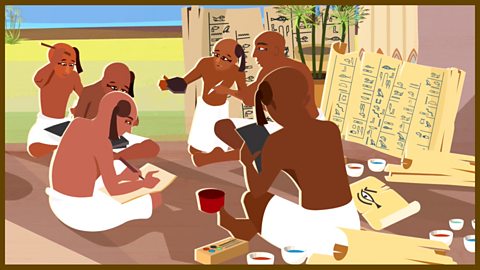Nanu is a 12 year old girl who works at home on the farmβ¦but who dreams of one day becoming a doctor.
Nanu: Hi I'm Nanu and this is my mother's farm. Well, I mean it actually belongs to Lord Wegaf or maybe even the Pharaoh!
I'm not sure, but anyway ever since my father died five years ago, it's been my mother and us children who have done all the work round here.
I'm the eldest daughter in the family with five little ones to help mum look after.
That's my older brother Ahkhom. He does most of the heavy farm-work since father died. But we all do our fair share.
Right now it's nearly the end of Akhet, the flooding season. The land is beginning to dry out and all that black silt and soil left behind by the Nile will be really good for growing crops.
That means it's going to be Peret soon, the growing season. That's why everyone is busy getting ready.
Ok, Idu, I have what I need now, let me have a look! That should draw out the splinter. Now, just be careful with it today and I'll have a look at it later.
Idu: Ok!
Nanu: I love helping people when they are sick or hurt. It's my dream that some day I can become a Swnwt, a doctor.
Of course, my mother says I'm dreaming! She says in Egypt farm girls don't get to be doctors, especially farm girls with trouble walking.
This is Imhotep - the patron god of doctors. I make an offering to him every day.
And I read everything I can get my hands on about healing and medicines. I can read quite well and even write a little.
The scribe from the temple of Sekhmet has been teaching my brother Ahkhom since our father died.
He has no children of his own to pass the skill on to and my mother convinced him to teach Ahkhom, so he comeshere many evenings.
And me? Well, it's amazing what you can pick up, if you sit close enough.
In fact, I'd say I'm definitely a better scribe than Ahkhom now and even the old scribe knows it.
Lady Wegaf? Did he eat those berries? Those berries are poisonous.
Lady Wegaf: Yes, but I don't know how many of them he's eaten!
Nanu: We need to act quickly. In a child so small those berries could be deadly.
Don't worry, I know what to do.
Here, get him to drink this. You have to trust me, there's no time to waste.
Lady Wegaf: It's okay my love, drink this, it will make you better. Goodbye Nanu and thank you!
Nanu: Lady Wagaf couldn't thank me enough for saving her child. I had heard she has a relative in the school of lady physicians.
So I told her that my dream is to be a doctor.
She says she will send a message right away to recommend me as an apprentice.
Anything for the girl who saved the life of her son.
Who says farm girls can't be doctors, or at least, doctors' apprentices.
Nanu - The Farm Girl
Video summary
This video follows the story of Nanu, a fictitious 12 year old farm girl from Ancient Egypt.
She lives with her mother and five brothers and sisters on a farm owned by Lord Wagaf. Since her father died, Nanu and her siblings work with their mother to run the farm - but Nanu dreams of becoming a doctor and makes offerings to the god of physicians every day.
We explore Nanuβs story and how important the River Nile was to successful farming in Ancient Egypt.
We learn about the different seasons of Ahket and Peret and how farming changed during these times.
During a visit to the farm Lady Wegafβs child gets sick after eating some poisonous berries. Nanu jumps to the rescue and saves the child using her understanding of medicine.
In return, Lady Wegaf agrees to help Nanu get int o the school of lady physicians and realise her dream of becoming a doctor!
Teacher's Notes
This video helps pupils explore life in Ancient Egypt and people from all sections of Ancient Egyptian society.
It provides a platform for teachers to discuss aspiration and barriers to success, with a focus on how everyone can achieve their goals.
This resource provides an opportunity for pupils to learn about the importance of aspiration and of inclusion.
The film introduces children to hieroglyphics and looks at the role that education played in the lives of Ancient Egyptian children.
Points for discussion (History Linked)
- What was Nanuβs dream?
- How was Nanu special?
- Why was Ahket important to farmers in Ancient Egypt?
- What do you think life was like on Nanuβs farm?
- How would you feel if you had saved someoneβs life?
- How would you feel if you were Lady Wegaf?
Suggested activities (Cross curricular opportunities)
Creative Writing β Write a letter from Lady Wegaf to thank Nanu for saving her childβs life and inviting Nanu to begin training to be a doctor. Then write a letter from Nanu to Lady Wegaf in response to her letter. Through their writing, pupils can explore how the characters felt, what happened during their time and the impact of the events on each character.
Life Near a River - Pupils to use an outline map of a river to investigate the positive and negative impacts of living close to one. Can they break the impacts into physical and human examples as they carry out this research?
Where does our food come from? - Pupils to use an outline map of the world to find out where their food comes from in a day. Can they plot the locations that their daily diet comes from, calculate how far it travels and then work out the total distance their food travelled in a day?
Careers and the World of Work - Pupils to have a series of cards with Ancient Egyptian and modern day job roles on. Pupils to cut these cards out and to then decide whether they are modern day or Ancient Egyptian jobs or both. Once the pupils have sorted the jobs, they can then think about what skills the people would need to carry out these jobs and why these were important.
This film is relevant for teaching History at KS2 in England, Wales and Northern Ireland and 2nd Level in Scotland.
Rames - The Engineer. video
Rames is 12 years old and about to join the thousands of workers constructing the pyramids.
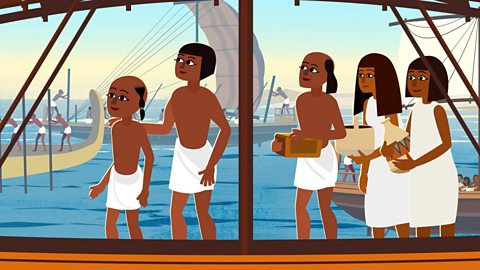
Hussein - The Water Boy. video
Hussein is a young water carrier working at the excavation of King Tutankhamun's tomb in 1922.
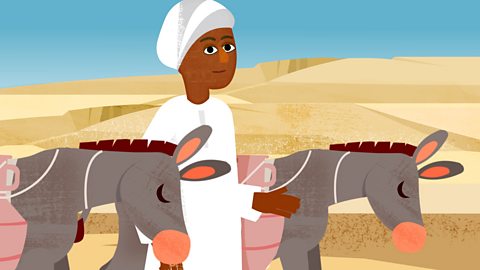
Society and culture. video
A deben weight is the historical artefact leading to an exploration of Society and culture.
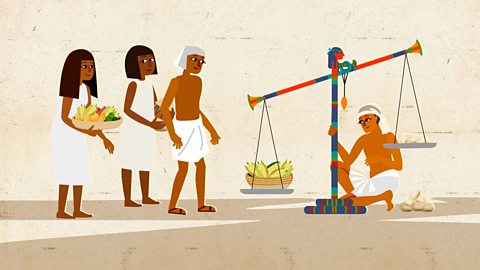
See also...
KS2 Music: Ancient Egypt. collection
A collection of fun, catchy songs and activities to help you consolidate your study of Ancient Egypt.
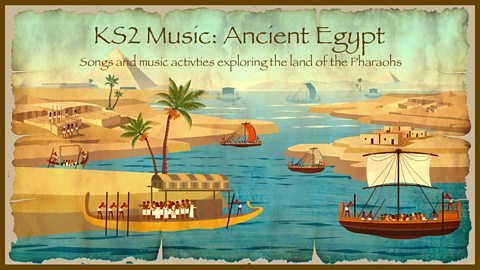
Song: 'Amulets and hieroglyphs'
Join in with a song about Ancient Egyptian society and culture.
